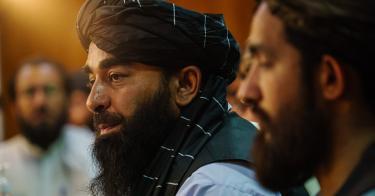The embarrassing withdrawal from Afghanistan has reminded America that the threat of a second 9/11 is real. For the past 20 years, American forces have engaged terrorist organizations within the Middle East to prevent them from organizing and refitting for attacks against the mainland of the United States.
However, the Taliban is stronger than ever and now has the autonomy to plan and mass resources against the West. It is crucial that the U.S. incorporates the lessons learned during the rise of ISIS to the rise of a currently emboldened Taliban.
During the growth of ISIS, the U.S. learned to always be prepared for attacks from radical foreigners and virtual operations on American media platforms.
During the spring of 2015, ISIS launched one of the most successful radical Islamic media campaigns the West has seen. Its media operations were so successful it did not need to send guerrillas to the U.S. because it could spawn homegrown terrorists through virtual platforms such as WhatsApp and Facebook.
ISIS’ radical Islamic information campaign radicalized 71 Americans to participate in ISIS-inspired activities. Out of those 71 homegrown recruits, 27% were planning to launch attacks on U.S. soil. ISIS successfully recruited 250 Americans in the fall of 2015 to travel to Syria.
Due to the failure of the Biden administration to keep the Taliban in check, the U.S. must prepare to counter the Taliban’s impending media campaign. It is unclear if the Taliban will attempt to expose the same weakness as ISIS, but the U.S. should remain diligent to combat homegrown terrorism.
The Taliban has used Facebook and other social media outlets to target people for “revenge killings.” Afghan citizens and Christians are quickly scrubbing their social media accounts and discarding their phones to not provoke Taliban retribution.
Facebook released a new feature that allows users to lock their account, making their account private to any non-friend. The feature was implemented because Afghani Facebook users were unable to censor their accounts quickly enough to avoid being punished by the Taliban.
The Taliban is broadly expanding its media messaging to recruit new members and recreate the Taliban’s narrative.
For context, in 1996, the Taliban began removing and banning media technology within Afghanistan. Taliban leadership originally considered media a threat to its regime. The Taliban has begun constructing four multimedia studios, a sharp change in behavior from banning communication technology.
From 2001 to 2021, social media has become the most effective way the Taliban strategically communicates its narrative. When the Taliban previously ruled, roughly 0.01% of the population had access to social media. Currently, there is about 4.4 million social media users in Afghanistan.
As the Taliban celebrated the withdrawal of the U.S. military, it asked Facebook and Twitter to continue its operations online. Zabihullah Mujahid, the Taliban’s spokesperson, claimed platforms that promote free speech such as Facebook should not ban their content.
As of Aug. 21, multiple Taliban representatives, including Mujahid, have over 300,000 followers each on Twitter alone. These Taliban representatives, designated terrorists by the United Nations, gain clout on Twitter, but former President Donald Trump remains banned.
Pro-Taliban media is responsible for donations and new recruits from Pakistan. The Taliban shared videos of its members capturing U.S. vehicle bays and looting American equipment. Five separate videos of Taliban leaders celebrating their victory with their soldiers originated on YouTube and spread across multiple social media platforms. Within 24 hours, they had reached half a million views.
The Taliban wants to be perceived as reasonable and open to discussion. Suhail Shaheen, Taliban representative to the U.N., tweeted Oct. 7 that the Taliban wishes to discuss, understand, and have positive interactions with the international community. Shaheen currently has over 531,000 followers on Twitter.
Media is critical in recreating its narrative, and U.S tech companies should actively deny the Taliban’s use of soft power to push its own narrative.
Facebook, WhatsApp, and Instagram will continue to remove Taliban-related content as long as the international community considers the Taliban a terrorist organization. However, given the lack of American intelligence on the ground and the Taliban’s new pool of resources, it will have the ability to adapt to new American social media algorithms.
Content moderation can be extremely dangerous and threaten the right to free speech, a fundamental democratic value. However, given the Taliban’s extremist, violent, and primitive actions, it has forfeited its ability to participate on American media platforms.
The Taliban clearly breaks many of Twitter’s own rules. Twitter’s published rules include topics such as violence, terrorism/violent extremism, child exploitation, and hateful conduct.
Why is Twitter allowing people who represent a terrorist organization that is infamous for its violence, abuse of women, targeting of minorities, and use of child soldiers to post on its platform? It’s disgraceful and hypocritical.
By not banning the Taliban from its platform, Twitter is choosing to contribute directly to the Taliban’s growing power.
Clearly, the retreat from Afghanistan has left Americans vulnerable to Taliban retribution. The Taliban is relying on American companies to strategically communicate with the world. Its reliance on American media is an opportunity. The U.S. should disrupt the Taliban’s soft power operations by isolating the Taliban from social media and other means to communicate with the globe.
This piece originally appeared in The Daily Signal



